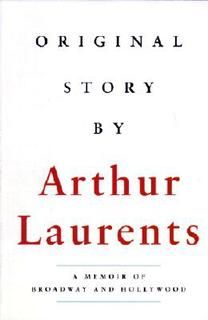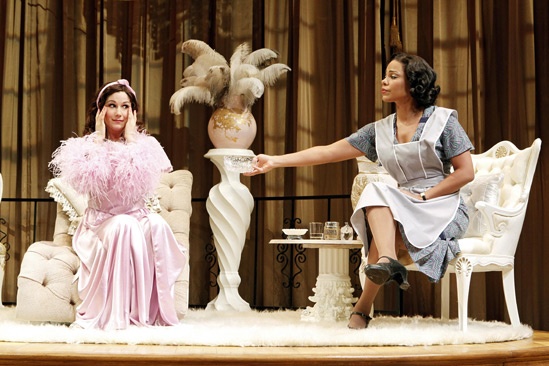Trumpeter Snooky Young sings and plays “Tain’t What You Do (It’s the Way That You Do It)” with Doc Severinsen and the Tonight Show Orchestra:
Archives for May 11, 2011
TT: Partial portrait
Today’s Google Doodle is an animated tribute to Martha Graham:
The Washington Post has a posting about Ryan Woodward, the animator, on its “Comic Riffs” blog. The author of the posting quotes from an essay that I wrote about Graham for Time in 1998. If you’d like to read the whole thing–which isn’t quite so laudatory as the quote suggests–go here.
TT: Arthur Laurents, R.I.P.
 Everybody’s having his or her say about Arthur Laurents, who wrote the books for Gypsy and West Side Story and who died the other day at the age of ninety-three. Much of what’s being said about him is a bit on the sanctimonious side, which is mildly amusing. The truth is that Laurents was one of the most detested people in the theater business, a genuinely nasty man about whom more than a few of his famous ex-friends had nothing good to say, just as he had nothing good to say about them. I suspect that his nastiness was rooted in the fact that he never succeeded in writing anything of lasting interest other than Gypsy and West Side Story, and resented his better-known collaborators for having made possible his own success, such as it was.
Everybody’s having his or her say about Arthur Laurents, who wrote the books for Gypsy and West Side Story and who died the other day at the age of ninety-three. Much of what’s being said about him is a bit on the sanctimonious side, which is mildly amusing. The truth is that Laurents was one of the most detested people in the theater business, a genuinely nasty man about whom more than a few of his famous ex-friends had nothing good to say, just as he had nothing good to say about them. I suspect that his nastiness was rooted in the fact that he never succeeded in writing anything of lasting interest other than Gypsy and West Side Story, and resented his better-known collaborators for having made possible his own success, such as it was.
For my part, I wrote nothing about Laurents’ death because I’d already said my piece about him in a Wall Street Journal review of Original Story By, his 2000 autobiography. Laurents spewed venom all over a long list of people, Jerome Robbins in particular, in Original Story By, which explains the last paragraph of my review:
Jerome Robbins was one of the twentieth century’s greatest choreographers, while Arthur Laurents will in the not-so-long run be remembered solely for having collaborated with his artistic betters, Robbins very much included. Small wonder, then, that Original Story By leaves a rancid taste in the mouth. For all its irresistible readability, too much of it stinks of smugness and spite–and envy.
So it did, and does.
TT: Slaves of the past
In today’s Wall Street Journal drama column I review the last two openings of the current New York season, Lynn Nottage’s By the Way, Meet Vera Stark and Tony Kushner’s The Intelligent Homosexual’s Guide to Capitalism and Socialism with a Key to the Scriptures. The first is good, the second long. Here’s an excerpt.
* * *
Fame caught up with Lynn Nottage when she won a Pulitzer for “Ruined,” but by then she was already known in the world of theater as a writer of real quality. One of her most noteworthy talents is the ability to write “political” plays in which the focus is not on abstract ideas but on ordinary people whose lives have been shaped–or twisted–by those ideas. “By the Way, Meet Vera Stark,” a portrait of a black film actress of the ’30s, is a choice example of her method. In the hands of a less accomplished artist, it could easily have become a droning study of Discrimination in Action. Instead, Ms. Nottage has given us a sharp-toothed comedy that makes its points through indirection rather than with self-righteous indignation. As ingeniously constructed as it is amusing, “Vera Stark” is a worthy successor to “Ruined,” and though Second Stage’s production doesn’t do justice to the play’s multi-layered subtleties, you should see it anyway.
 In the first act, set in 1933, we meet the title character, a spunky young black woman (Sanaa Lathan) who works as a maid for a white film star (Stephanie J. Block) but longs to break into the movies herself. When Gloria, Vera’s employer, gets a shot at the lead role in a high-calorie weeper called “The Belle of New Orleans” that also has a small but choice part for a slave, Vera contrives through elaborately silly means to audition for the part. Then we flash forward to 2003 and learn that she not only got it but became one of the most successful black actresses in Hollywood–though she was never allowed to play anything other than slaves and maids. The second act is set at an academic colloquium called “Rediscovering Vera Stark” in which three pseudo-hip film-studies professors (Daniel Breaker, Kimberly Hébert Gregory and Karen Olivo) wrangle over the meaning of Vera’s career and show a clip of a 1973 talk-show appearance in which she and Gloria are reunited for the first time in years.
In the first act, set in 1933, we meet the title character, a spunky young black woman (Sanaa Lathan) who works as a maid for a white film star (Stephanie J. Block) but longs to break into the movies herself. When Gloria, Vera’s employer, gets a shot at the lead role in a high-calorie weeper called “The Belle of New Orleans” that also has a small but choice part for a slave, Vera contrives through elaborately silly means to audition for the part. Then we flash forward to 2003 and learn that she not only got it but became one of the most successful black actresses in Hollywood–though she was never allowed to play anything other than slaves and maids. The second act is set at an academic colloquium called “Rediscovering Vera Stark” in which three pseudo-hip film-studies professors (Daniel Breaker, Kimberly Hébert Gregory and Karen Olivo) wrangle over the meaning of Vera’s career and show a clip of a 1973 talk-show appearance in which she and Gloria are reunited for the first time in years.
This too-tight précis only hints at the barbed irony with which Ms. Nottage sketches the proliferating complexities of Vera’s life. Desperate to become a star, she learns that Hollywood stardom is a better-paid form of enslavement in which stereotypes are the shackles….
If you think that Tony Kushner is a genius, then you’re likely to be surprised and disappointed by “The Intelligent Homosexual’s Guide to Capitalism and Socialism with a Key to the Scriptures,” which is a garrulous, rambling mess. If, on the other hand, you think that Mr. Kushner is a flawed artist who’s never learned how to make fully effective use of his gifts, then you’re more likely to see “The Intelligent Homosexual’s Guide” as all of a piece with his earlier plays. Like “Angels in America” and “Homebody/Kabul” before it, “The Intelligent Homosexual’s Guide” is too long–three hours and 40 minutes, to be exact–and too diffuse to be easily endured by anyone lacking the patience of a secular saint….
* * *
Read the whole thing here.
TT: Snapshot
Evelyn Waugh talks to Elizabeth Jane Howard about the modern novel on Monitor, originally telecast by the BBC in 1964:
(This is the latest in a weekly series of arts-related videos that appear in this space each Wednesday.)
TT: The whole eight minutes
If you’re curious, the complete text of the commencement address I delivered last Saturday at Rollins College is here.
TT: Almanac
“I have lately been reading both Joyce and Proust with considerable disappointment; they both seem to me very sick men, giant invalids who, in spite of enormous talent, were crippled by the same disease, elephantiasis of the ego. They both attempted titanic tasks, and both failed for lack of that dull but healthy quality without which no masterpiece can be contrived, a sense of proportion.”
Cyril Connolly, “Comment” (Horizon, May 1941)
